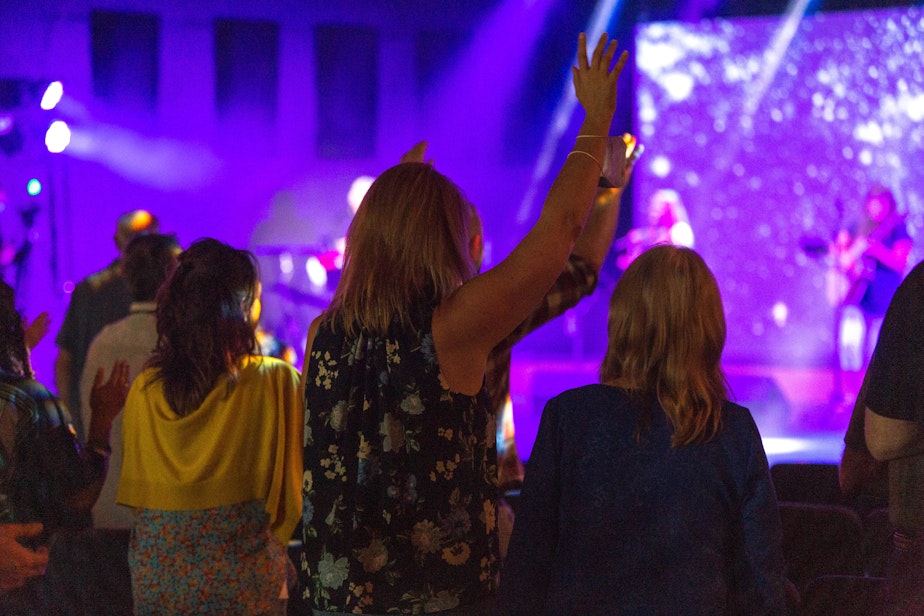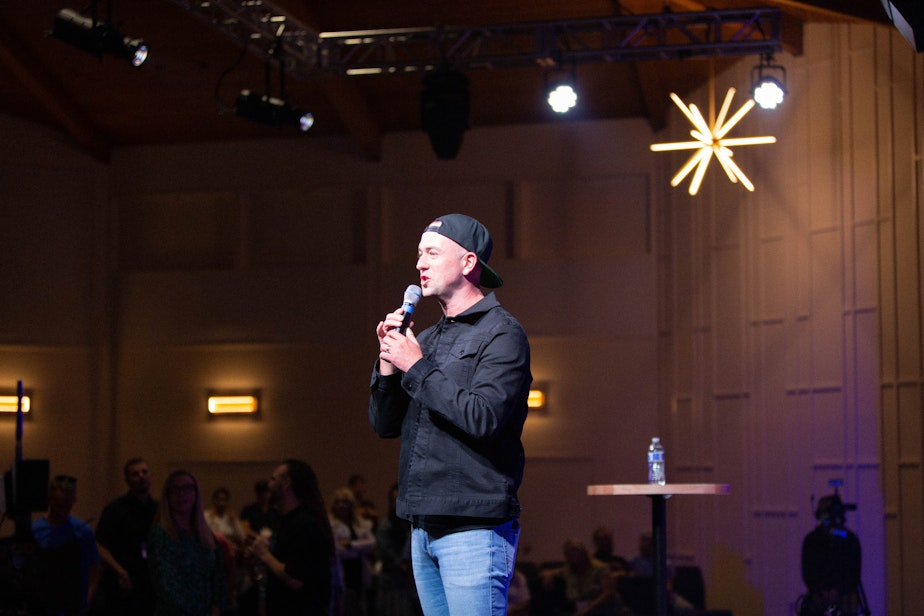A Sunday service, a funeral, and a conference: How some churches spread Covid in the Seattle area

Gail Fleming, a pastor, got Covid last summer from a church conference.
Even so, Fleming is glad she went, she said, and that she would do it again. That’s how much she felt the experience was worth it.
"When we all come together, there's just a beautiful synergy in the Holy Spirit that feeds our soul, feeds our spirit, makes us come alive,” she said.
Fleming is a pastor at Newcastle, Washington-based Seattle Revival Center, a charismatic, non-denominational church.
Throughout the pandemic, one reason Covid-19 has been able to spread so far is because people kept gathering without proper safety measures. The coronavirus outbreak at Seattle Revival Center was one of nearly 30 at houses of worship in King County.
These outbreaks — many at churches — offer a window into how views of religious freedom, along with the public's Covid fatigue, have clashed with government regulations to control the virus.
An outbreak would have seemed very unlikely at Seattle Revival Center if you had looked at them last year at the very beginning of the pandemic.
Sponsored
At that time, Seattle Revival Center embraced online-only services. They staged full productions with a style somewhere between Saturday Night Live and Sesame Street.
Pastors cracked jokes in comedy sketches, puppets played roles from “What-If Wilbur” to Judas Iscariot in an Easter passion play, and they even filmed a music video for a social distancing rap called “Hey Hey Hey (Stay 6 ft. Away)”.
“Even if you can’t gather in a building, that’s one of the things that we’re learning is that this digital era, it gives us these incredible opportunities for connection,” lead pastor Darren Stott said in a KING 5 TV story about their streaming worship services.
That was during the Stay at Home order last spring. Then, cases fell and the state allowed more activities to open up – with limitations.
The church went by the book and met outdoors – as uncomfortable as that was, Stott told KUOW.
Sponsored
“Now our families are standing outside, shivering,” he said. “It's raining, it's windy, and we are doing all of this in the name of health.”
The restrictions changed again, and churches could resume gathering inside – if everyone wore masks and kept 6 feet of physical distance. Plus, no choirs.
The full Covid restrictions for religious organizations are pages long and at times convey a tone and level of detail on par with the biblical book of Leviticus (without rules on sacrificing bulls.)
But unlike Leviticus, those Covid restrictions changed every few months over the course of the pandemic.
And despite their early acceptance – or "submission," according to Stott – these rules began to feel like a burden for Seattle Revival Center.
Sponsored
“At a certain point, we said enough is enough,” Stott said. “This is absurd.”
He called it major government overreach.
The church decided not to follow the state’s rules for religious organizations and instead interpreted the safety guidelines their own way.
“We're walking this out as a religious faith organization, knowing that there is a separation of church and state that still does exist,” he said.

Sponsored
Six months into the pandemic, in August, the church hosted an in-person conference known as the Week of Awakening with visiting pastors and around 200 attendees for more than a week.
Those in attendance signed waivers acknowledging the risk, got temperature checks, and wore masks until they got to their seats.
Gathering in person is vital for the church community, pastor Gail Fleming said.
“When you say you can't go to church anymore and you have to stay home, everything’s on hold,” she said. “You're sitting at home, staring at walls. That's not good for people.”
Videos posted to YouTube show one Saturday night conference session where around one hundred people without masks sat close together. They cheered loudly as a woman walked without her cane after prayer.
Sponsored
Praying for healing with physical touch is an important part of the church’s practice.
Throughout the week groups of people crowded together and prayed for healing. Pastors leaned close and laid hands on their foreheads and backs.
The custom hearkens back to verses in the biblical book of James: "Is anyone among you sick? Let them call the elders of the church to pray over them and anoint them with oil in the name of the Lord."
At the same time, the conditions inside the church conference are known to spread Covid: Lots of people, close together inside for long periods of time, touching and singing with no masks.
During the conference Gail Fleming MC-ed on stage at times, reciting scripture and praising God.
“I was just saying this morning, ‘Lord, I feel so full,” she told the crowd in front of her.
It was an easy decision to attend, despite the risk, she said in an interview with KUOW.
“I just wasn't going to live in any fear at all,” Fleming said. “I'm 74 years old, I've had a great life.”
She loved every minute of it, she said.
After more than a week there, Fleming got a fever. Other Covid symptoms followed.
“I lost all my taste, a sense of smell,” she said. “We had all those fires, all the smoke coming down here, I couldn’t smell the smoke at all.”
Fleming was fatigued for two solid weeks, she said, and even had some trouble breathing for a bit – but she recovered.
In an interview, lead Pastor Darren Stott reflected on the decision to hold the conference.
“That would have been an unwise choice at that time,” he said. “And the fruit of an unwise choice speaks for itself.”
Twenty-eight people got Covid in this outbreak. No one died.
Other congregations were not as lucky.
For example, about a month later at the First Pentecostal Church of Auburn, 14 people got Covid and two died, according to public health records.
That outbreak is linked to a Sunday morning service where people sang their hearts out and crowded close together for around two hours, as shown on a public Facebook video.
North of there, in Des Moines, the Samoan Christian Fellowship had two outbreaks. One from a church fundraiser August 2020, and another, bigger outbreak from a funeral in January 2021.
Public health records say a relative tested positive for Covid, but attended the funeral anyway and hugged a lot of people. Both churches declined to comment.
Outbreaks at houses of worship account for a comparatively small number of known Covid cases in King County – nearly 300 cases, according to data from Public Health – Seattle & King County.
But they have an outsized impact. On average, 10 people have gotten Covid at each outbreak at a place of worship, compared to 4 at schools, and a range of 4 to 9 at non-healthcare worksites.
What’s more, churches are made up of members of the community who gather regularly and then disperse, said Antoinette Craig, a branch director at the Tacoma-Pierce County Health Department who oversees church outbreak investigations.
“The spread of COVID can happen very quickly and very easily just by the simple nature of people going about their daily routines,” she said.
As recently as April 2021, the Tacoma-Pierce County health department warned that outbreaks at a few churches led to 70 cases of Covid throughout the community, including schools and youth events.
“It doesn’t take much, right? It can just be one person,” said Vance Kawakami, who oversaw outbreak investigations of those churches for Public Health – Seattle & King County.
But with Covid, Public Health can’t track each person down.
In King County, around 100 cases of Covid at religious organizations were considered high priority but investigators never looked into them.
Some congregations weren’t even informed that a contagious person had been there to worship, according to public records obtained by KUOW that cover the period March 2020 to February 2021.
Before Covid, investigating an outbreak of any disease would be an all-hands-on-deck affair, Kawakami said. But then the pandemic hit.
“To have multiple of these type of outbreaks happen every day, as you can imagine, is just very difficult to try to manage,” he said.
Public Health just doesn’t have enough staff.
“It’s been a very long year,” Kawakami said.
Seattle Revival Center has not had more Covid cases since the outbreak last summer, as far as Pastor Darren Stott and public health authorities know. That’s even though the church resumed worshiping indoors for long services, following a post-outbreak hiatus.
Even before mask restrictions lifted, most people at church didn’t wear them. Stott said he is not afraid of the virus.
“People need to go out and confront the things in their life that are scaring them," he said. "Not just coronavirus, but anything that's intimidating us and trying to control us that's unfair and unjust."
Going forward, when it comes to things like vaccinated-only sections of church, Stott called it giving into “fear-based culture.”
The church lives by different values, he said.




